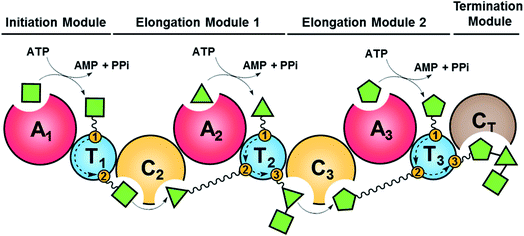Abstract:
Fungal nonribosomal peptides (NRPs) and the related polyketide–nonribosomal peptide hybrid products (PK–NRPs) are a prolific source of bioactive compounds, some of which have been developed into essential drugs. The synthesis of these complex natural products (NPs) utilizes nonribosomal peptide synthetases (NRPSs), multidomain megaenzymes that assemble specific peptide products by sequential condensation of amino acids and amino acid-like substances, independent of the ribosome. NRPSs, collaborating polyketide synthase modules, and their associated tailoring enzymes involved in product maturation represent promising targets for NP structure diversification and the generation of small molecule unnatural products (uNPs) with improved or novel bioactivities. Indeed, reprogramming of NRPSs and recruiting of novel tailoring enzymes is the strategy by which nature evolves NRP products. The recent years have witnessed a rapid development in the discovery and identification of novel NRPs and PK–NRPs, and significant advances have also been made towards the engineering of fungal NRP assembly lines to generate uNP peptides. However, the intrinsic complexities of fungal NRP and PK–NRP biosynthesis, and the large size of the NRPSs still present formidable conceptual and technical challenges for the rational and efficient reprogramming of these pathways. This review examines key examples for the successful (and for some less-successful) re-engineering of fungal NRPS assembly lines to inform future efforts towards generating novel, biologically active peptides and PK–NRPs.



